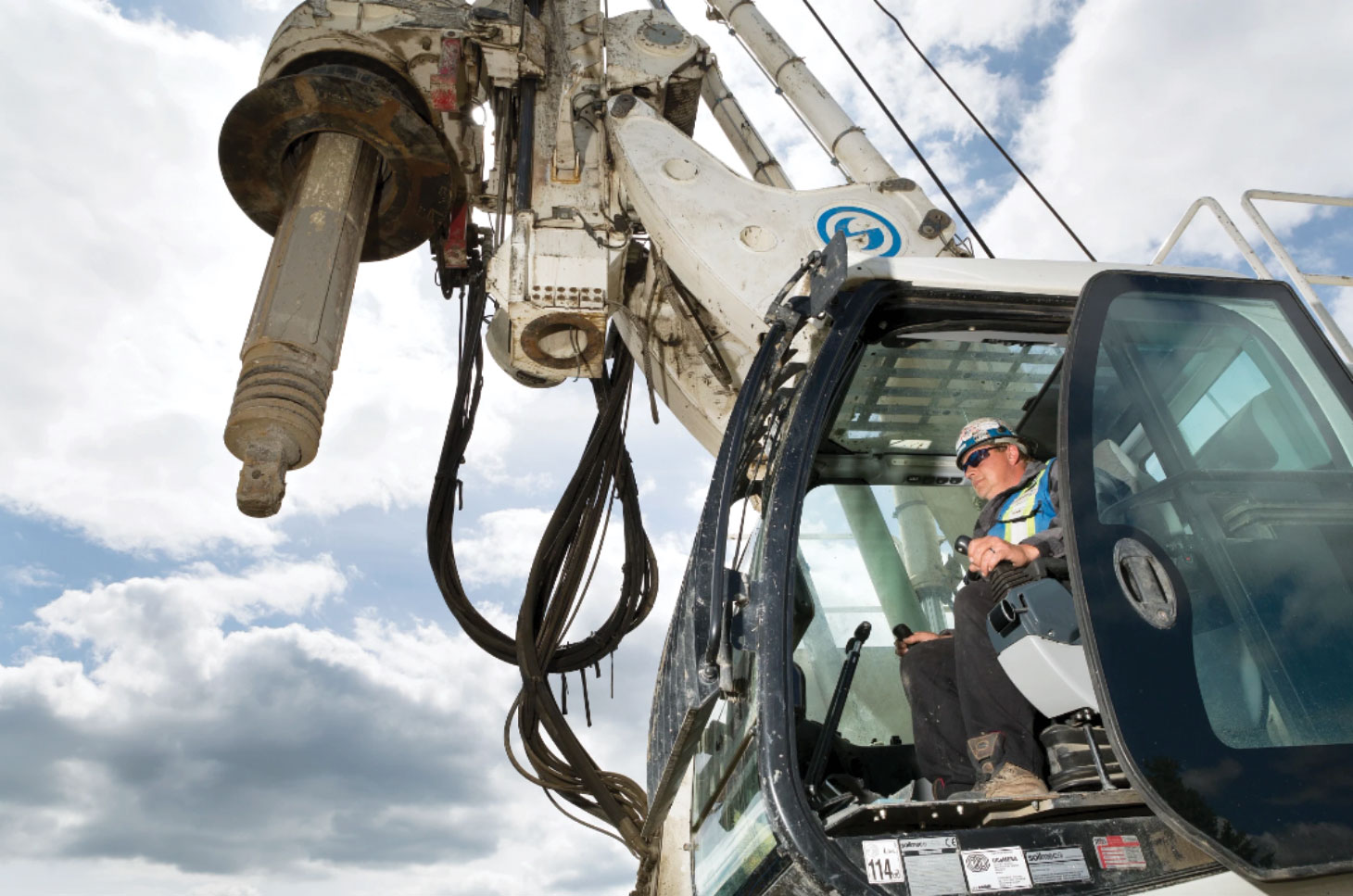
The construction industry has long been a stable employment choice for individuals interested in pursuing the many avenues it offers – including becoming a drill rig operator.
The Northern Alberta Institute of Technology (NAIT) now offers the Foundation Drill Rig Operator program in collaboration with the International Association of Foundation Drilling (ADSC-IAFD), designed for industrial, commercial and residential construction projects. With the goal to make this accessible to everyone, this self-paced online program allows students to complete the course at their own speed, whether they are working and can only study in the evenings and weekends, or new entrants to the field who can dedicate more time and finish faster.
“The ADSC-IAFD partnered with the National Commission for the Certification of Crane Operators [NCCCO] to provide the only ANSI-accredited foundation drill rig operator certification in North America at this moment,” said Kevin Sharp, an account manager at Equipment Corporation of America (ECA) Canada. ECA is a provider of reliable drilling, pile driving, hoisting and rigging, slurry cutting, soil mixing and soil stabilization equipment.
“We work very closely with the NCCCO to [provide] candidates with the knowledge so they can successfully pass the written and practical parts of the certification program,” said Sharp.
Sharp says the NAIT program provides education and training for entry-level workers in the industry.
“It provides the student with a vast array of knowledge that can be learned in front of a computer and can be used as vital learning points in the field,” he said.
“The Foundation Drill Rig Operator program at NAIT is like a treasure trove of knowledge for new operators in the industry.”
Karla Barron, Northern Alberta Institute of Technology
In keeping pace with technological advancements and best practices, NAIT collaborates closely with industry and stakeholders to ensure that the material being taught remains relevant and up to date. Presently, there are two levels to the NAIT program, both pertaining to large diameter drill rigs. Additionally, there is also an independent course, FDRO250, which pertains to micropile and anchoring rigs.
“The Foundation Drill Rig Operator program at NAIT is like a treasure trove of knowledge for new operators in the industry,” said Karla Barron, program manager at NAIT. “With nine modules covering everything from safety to types of drill rigs, students are equipped with the tools they need to succeed out in the field. This is a self-paced online program and participants have up to six months to complete the courses, allowing them to take the training while working.”
Barron emphasizes that while NAIT’s program doesn’t offer certification to operate drill rigs directly, it provides certificates of achievement for Level I and Level II after successful completion of the courses.
“The program ensures students are well-prepared to [tackle] the NCCCO Drill Rig Operator exam. This exam was the result of a collaboration between the ADSC-IAFD and NCCCO,” she said.
With respect to the specific skills and competencies that are assessed during the NAIT certification process, some specific course outcomes covered within the Level 1 series include: describing the steps to set up, shut down and secure a foundation drill rig; describe North American legislation and industry governing standards; and perform math calculations used in developing foundation rigging plans.
Drill rig certification
Other than in Ontario, there currently is no mandatory certification for drill rig operators in Canada. “However, it is my opinion that although the Ontario program is possibly a step in the right direction, it is based on crane operation and was developed as a reaction to a fatality in 2012,” said Sharp.
Barron says that the NAIT program is ahead of the curve, anticipating future regulatory requirements across North America. “It’s not just about meeting standards, but about being proactive and addressing safety concerns before they arise,” she said.

Sharp agrees and adds that while certification is the end game, education and training is the main part of the NAIT program and an important part of the eventual certification process. With respect to how certification can enhance the professionalism and credibility of drill rig operators, Barron says certification not only gives operators the confidence to do their job well, “but also demonstrates to stakeholders that the deep foundation drilling industry values its people through ongoing training and education. It enhances professionalism and credibility, setting certified operators apart in the industry.”
Stakeholder engagement is crucial for NAIT programs to stay relevant; as such, NAIT collaborates with industry partners to ensure the curriculum is aligned with the ever-evolving advancements in the industry. At the present time, there are no ongoing professional development requirements by NAIT. However, NCCCO offers programs that are essential for candidates to uphold their accreditation.
“Staying on top of industry standards and best practices is vital for drill rig operators to maintain their accreditation and continue excelling in their careers,” said Barron.
Long-term benefits
There are long-term benefits of investing in drill rig operator certification for both companies and the entire industry. “Investing in training and certification not only creates a strong culture within companies but also helps attract and retain talent in the industry,” said Barron. “This investment can lead to a more skilled and dedicated workforce, addressing the ongoing labour shortage in the industry.”
“Having a certified operator on your site ensures that they have met some level of training and education that provided them the ability to successfully complete the certification process. It provides stakeholders with the confidence that the operator can complete tasks safely and efficiently.”
Kevin Sharp, ECA Canada
Sharp agrees, adding that being a certified operator provides a level of confidence to stakeholders that the deep foundation drilling industry cares about its largest asset – people. “We invest in training, education and on-the-job training to ensure that our operators are adequately equipped to work in an inherently risky profession with confidence,” he said.
And while certification provides stakeholders with confidence that the operator is trained and can pass the certification program, those in the industry realize the learning process is ongoing.
Career advancement
Career advancement certainly exists in this small and dynamic industry, which is why operator training, education and certification provides opportunities in the industry as people continue to gain experience and knowledge. It provides individuals with a pathway for a long career in the deep foundation industry.
“Having a certified operator on your site ensures that they have met some level of training and education that provided them the ability to successfully complete the certification process,” said Sharp. “It provides stakeholders with the confidence that the operator can complete tasks safely and efficiently.”
Barron agrees and says the safety implications of having certified drill rig operators onsite are significant. “Certification demonstrates that operators have received proper training and education provide stakeholders with peace of mind,” she said. “The NAIT Foundation Drill Rig Operator program has a significant focus on safety in drill rig operations.”
Employing non-certified drill rig operators can potentially pose risks. “While the industry is working on providing necessary tools for safe and efficient drill rig operations, mandating certification may be the key to ensuring all operators meet the required standards for safety and competence,” she said.
However, certification is just one piece of the puzzle when it comes to ensuring safe, efficient and effective drilling operations. “Education, training, on-the-job experience and client training all play integral roles in achieving this goal,” said Barron.
Additionally, there are the long-term benefits of investing in drill rig operator certification.
“I believe that anytime that industry or companies invest in their human assets, they create a very strong culture,” said Sharp. “It is a culture of care and where operators feel valued. As an industry and as owners, we can keep people [working in] our industry and entice people to consider a career in our industry. I strongly believe if the industry had really bought into this philosophy 10 years ago, we would not be in the dire shortage of labour that we are currently in.”